Dentures – Los Angeles, CA
Replace All of Your Missing Teeth at Once
What kind of dental prosthetic comes to mind first when it comes to replacing missing teeth? For many people, the answer is dentures; even in the modern age, they remain a popular choice for anyone who is struggling with multiple missing teeth. Dr. Azarian and Dr. Silvera can provide dentures that fit comfortably and allow you to enjoy the benefits of a full dazzling smile again. Get in touch with us today if you’re interested in getting dentures.
Why Choose Rancho Park Dental Group for Dentures?
- Long-Lasting, Natural-Looking Materials
- Partnered with Local Implant Specialists
- State-of-the-Art Digital Impressions
Who's a Good Candidate for Dentures?

It’s important to carefully consider the available solutions when there are multiple teeth that need to be replaced. Dentures are a very popular option for rebuilding smiles, but are they really the right choice for you? To find out, you need to visit our team for an examination. Based on the state of your teeth, gums, and jawbone, we can figure out whether you’re an ideal denture candidate and recommend the next steps you should take.
Effects of Missing Teeth

For adults, the leading cause of tooth loss is gum disease, but you might also end up with gaps in your grin as a result of ignoring a cavity or getting hit in the face. Tooth loss comes with a number of consequences, such as the following:
- Your jaw may start to lose bone density, gradually growing weaker over time.
- Your face may begin to sag after a while, making you look older.
- It may be more difficult to chew your food properly, and there might be certain foods that you’re no longer able to eat at all.
- The loss of certain teeth can make it more difficult to speak clearly.
- Your self-esteem will likely suffer, and you might experience feelings of sadness or depression.
What Qualifies You for Dentures?

Most adults who have lost many or all of their teeth are able to get dentures. A strong jawbone and healthy gum tissue are required; our team can make sure that you meet these criteria during your initial consultation. Ideally, you should also have a strong commitment to good oral hygiene to ensure that your dentures last as long as possible.
Different patients will qualify for different kinds of dentures. Those who still have some healthy teeth will likely receive partial dentures. Full dentures will be used when all of the teeth have been lost. If there’s enough bone in your jaw (or if you are willing to complete a bone grafting treatment), you may be able to get dental implants to support your dentures. Remember that no matter which kind of denture you get, it will be uniquely personalized for your smile to ensure the best possible fit and function.
Alternative Tooth-Replacement Options

Sometimes we might take a look at your mouth and find that dentures are not the best choice for restoring your smile. Instead, we may suggest one of the following alternatives:
- Dental Bridges: Dental bridges can completely fill in gaps left by at least one missing tooth. The crowns at either end of the bridge keep it anchored to two of your remaining teeth (referred to as the abutment teeth).
- Dental Implants: Dental implant posts inserted in the jaw can be used to replace any number of teeth. Dental implants cost more than other tooth replacement options but have unique benefits such as mimicking the functions of natural tooth roots.
Types of Dentures

A patient who still has some healthy teeth remaining will not have the same needs as someone who has lost all of their teeth. We may suggest different types of dentures based on your situation, and we’ll be glad to take the time to explain our recommendations and what the advantages are.
Partial Dentures
Partial dentures come in a variety of shapes and sizes in order to replace teeth that are missing in specific parts of the mouth. In many cases, the gum-colored base of a partial denture is supported by metal. It’s easy to clean partial dentures thoroughly because you can easily take them out of your mouth when necessary.
Full Dentures
Full dentures remain a cost-effective way to replace an entire row of missing teeth. Between the gum-colored base and the lifelike prosthetic teeth, you’ll have a very natural-looking new grin to show the world. Additionally, a complete set of teeth is vital for enjoying various kinds of foods.
Implant Dentures
Are you worried about dentures slipping at awkward times? You can ensure that your replacement teeth always stay in place if you have them anchored to dental implants – small screwlike posts that form a strong bond with the jawbone. Unlike traditional dentures, implant dentures can actively help prevent bone loss in your jaw.
How Dentures Are Made

Once you make the life-changing decision to restore your smile with the help of dentures, you may be curious about what the process to create them looks like. Understanding how they’re crafted and which materials are used in the process can help you better appreciate your new smile!
Whether you choose a partial, full, or implant denture, here’s what you can expect from the denture making process.
What Are Dentures Made Of?

There are two parts to every denture: the denture base, and the teeth. Here’s a breakdown of these components:
- Denture Base: The denture base is the foundational structure of the prosthetic that holds the artificial teeth (crowns) in place. The base can be made of a variety of materials, including acrylic, nylon, porcelain, resin, or even metal. Full dentures are commonly made with acrylic because it can be easily customized to match your natural gum tissue. For partial dentures, your dentist may use metal clips in conjunction with an acrylic base. In other cases, they may use nylon instead of acrylic.
- Artificial Teeth or Crowns: Crowns are usually made from resin or porcelain because they both look like natural teeth; however, porcelain is typically the most popular option because it not only looks like but feels like your other teeth. It is also very durable, but because it can be abrasive to surrounding teeth, it is typically only used in full dentures.
The Denture Creation Process

Because each denture is customized to fit the patient’s mouth, they require a multi-step process to manufacture. Here is a step-by-step guide for what the typical timeline looks like:
- Step 1: First, your Rancho Park Dental Group dentist will take impressions of your upper and lower gums using a thick paste. This paste will harden and be used to make a plaster model of your mouth. This is done to ensure that your final denture is the correct size and shape. Your dentist may also take measurements of your jaw at this time.
- Step 2: Next, the model is sent off to a trusted dental laboratory for your new dentures to be made. A wax version of the gum line will then be created as well.
- Step 3: In the next step, the dental laboratory will set the acrylic resin crowns in place. A mechanical device called an articulator will attach the teeth to the model with wax, while a technician makes minor adjustments by shaping and carving the wax to ensure that it resembles your gums. The base will then be used for your finished dentures.
- Step 4: Next, the wax dentures are sent off to Dr. Silvera and Dr. Azarian for a fitting. Once they arrive, you will come in to approve them or request modifications. Upon approval, the dentures will then be sent back to the lab to be completed. In the meantime, you will be given temporary dentures to use until they are ready.
- Step 5: Once your dentures return to the lab, the technician will boil them to melt away the wax. They will then be placed in a flask and covered in plaster to maintain their shape. The technician will add water to melt the dentures.
- Step 6: Next, holes are made in the teeth crowns so the material can attach to it. The lab technician will then add a liquid separator to the plaster layer to prevent the acrylic from sticking to it. The acrylic will then be injected into the flask to replace the wax.
- Step 7: After it hardens, the plaster is gently removed using special lab tools, revealing the denture. They are then sent to an ultrasonic bath which will remove any remaining plaster.
- Step 8: Next, if there is any excess acrylic, it will be cut from the denture. Once it is trimmed down, the lab technician will polish it, so it looks great and feels smooth and comfortable in your mouth.
- Step 9: Once your denture is ready, you will be scheduled to return to Rancho Park Dental Group for a fitting. Dr. Silvera and Dr. Azarian will make any necessary adjustments at this time to ensure that your new dentures fit comfortably.
Adjusting to Your New Dentures

Some discomfort is normal when adjusting to new pair of dentures, even if this isn’t your first pair. Initially, you may feel some mild soreness and have difficulty speaking and eating while wearing them. Thankfully, with continued use, you will get used to your new dentures and they will feel very similar to your natural teeth.
To help speed up the adjustment period, be sure to follow the instructions from Dr. Silvera and Dr. Azarian. Start by eating soft foods and gradually work your way up to harder foods, exercise your facial muscles, and try using a denture adhesive. Should you continue to experience prolonged discomfort, contact Rancho Park Dental Group to be seen for adjustments.
The Benefits of Dentures

Certain daily habits can become more difficult to do if you lose some or all of your teeth, such as eating, talking, and smiling confidently. However, dentures can reliably replace your missing pearly whites and boost your overall quality of life for many years to come. Here are some of the advantages you can expect to enjoy with these custom-designed prosthetics.
Psychological Benefits

People who are struggling with tooth loss can often experience several psychological downsides. Since they’re missing some or most of their smile, they’ll likely want to hide their mouth and be less willing to engage in social events. Instead of living with lower self-esteem, you can renew your appearance and the function of your smile with dentures. With these prosthetics, you’ll be able to reduce any anxieties about your looks, speech, eating ability, and more.
Clearer Enunciation

Speaking clearly can be more challenging if you’re missing some of your teeth. This is because your tongue and lips typically need to be placed properly against your smile to effectively pronounce sounds and words. By restoring your bite with dentures, you’ll regain the ability to enunciate more clearly. This will take some time and practice, but it’ll eventually feel more natural for you.
Improves Nutrition

Those struggling with missing teeth often have to change their diet, meaning they’re more likely to miss out on numerous nutritious options. Even some fruits, vegetables, and lean protein can be too tough to chew, especially if you don’t have your full bite. Renewing your smile with dentures can help expand your choice of food, that way you can enjoy more nutritious meals to promote better oral and overall health.
Preserves Oral Health

Did you know that your remaining teeth can start to move out of place if you’re missing some of them? This is because the jawbone can begin to deteriorate from a lack of stimulation, causing your other pearly whites to weaken or shift to fill in the gap(s). With dentures, you can help preserve their positions as well as distribute the pressures of chewing more evenly throughout your bite.
Expands Opportunities

Most people will primarily notice your smile when first meeting them. If you’re missing teeth, then restoring them with dentures can raise your chances of making a great impression. Not only will you feel more confident, but others will see how you carry yourself and perceive you as more outgoing and approachable. This can help expand your social and professional opportunities, as you won’t be afraid to show off your beautiful smile.
Dentures Aftercare

Dentures can help to completely transform the appearance and function of your smile. However, even if you don’t have any natural teeth left, this doesn’t mean that you should stop seeing your dentist. You should still be attending regular cleanings and checkups for numerous different reasons. Your dentist will continue to monitor your existing teeth and gum tissue. They will also keep an eye out for any abnormalities that could indicate that you have oral cancer. When you wear dentures, it is more difficult to notice these changes in your mouth on your own. Early detection is key to making a full recovery.
Removeable Dentures

Remove After Eating
After each meal, remove and rinse off your dentures. Doing this helps to prevent buildups of food debris and plaque. When rinsing, don’t use hot water. Heat can warp the denture material and cause it not to fit properly.
Clean Your Restoration
Remove your dentures to clean them. Using a soft-bristled toothbrush and hand soap, mild dish soap, or denture cleanser, gently brush your dentures. Don’t use regular toothpaste because dentures are not made to stand up to abrasive products. If you aren’t going to wear your dentures again right away, place them in a container of water or denture-cleansing solution so they don’t dry out and lose their shape. Remember to always rinse your dentures thoroughly before putting them back in your mouth. These cleaning materials are not intended to be used in the mouth.
Keep Your Dentures Safe
When you clean your dentures, you may want to place a towel beneath you in case you accidentally drop them. This will reduce the probability of your dentures becoming damaged. Keep your dentures out of reach of small children and pets.
Remove When You Sleep
Before you go to bed, take your dentures out. Wearing dentures restricts the circulation in your gums, leading to soft-tissue irritation. Sleep with dentures has also been associated with a higher risk of pneumonia as well as higher levels of gum and tongue plaque. Keep your dentures in a denture-soaking solution overnight. If you allow your dentures to dry out, they can permanently lose their shape.
Notice Changes
Keep an eye out for changes so you can address them with your dentist. This includes mouth sores, gum irritation, or signs of infection. If your dentures become damaged in any way, don’t attempt to repair them on your own. You could accidentally damage them further. Instead, give us a call so we can help.
All-on-4 Dentures
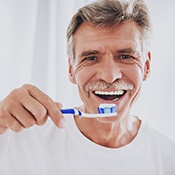
If you have All-on-4 dentures, the aftercare process looks a little bit different. You should brush your dentures twice a day using a soft-bristled manual or electric toothbrush and non-abrasive toothpaste. Stay away from toothpaste containing baking soda or stain-removing agents. Remember to floss your replacement teeth once a day. Rinsing with mouthwash is another great way to keep your new smile fresh.
Understanding the Cost of Dentures
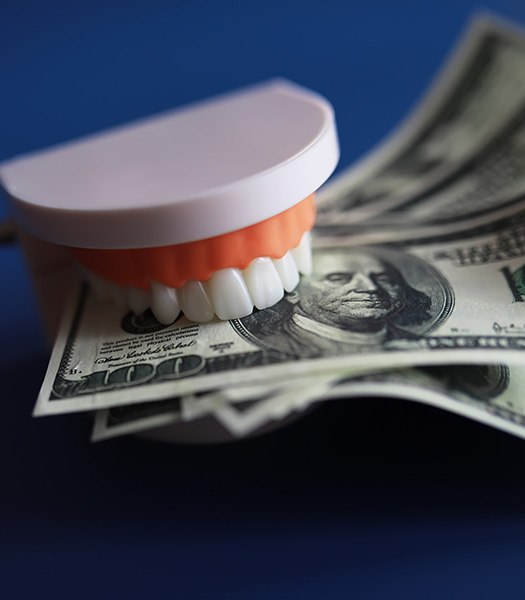
Dentures are a reliable way to rebuild your grin after tooth loss, but many patients worry whether they can afford their restoration. Our team is happy to give you an estimate after you’ve had a consultation with one of our Ranchero Park Dental Group providers. You might not pay the same exact amount as someone else because your new teeth are customized at every stage of creation to meet your unique needs.
Continue reading to learn more about the cost of dentures, and feel free to contact us for additional information.
Factors That Affect the Cost of Dentures
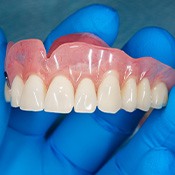
Once we’ve had a chance to examine your mouth and know more about what’s needed to restore your smile, we’ll have a better idea of how much you can expect to pay for prosthetics. Several factors can influence the price, such as:
- The preparation required. Sometimes, patients have one or two remaining teeth must be extracted for dentures to fit correctly, which comes with its own associated fees.
- The materials used for the base. The base can be made of acrylic, resin, metal, and other materials influencing the amount due.
- What the pontics (artificial teeth) are made from. These are usually durable porcelain but can also be made from resin.
Are Implant Dentures More Expensive?
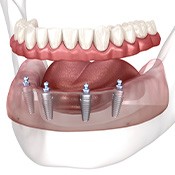
Some patients struggle with frequently ill-fitting prosthetics due to a rapidly thinning jawbone, or grow frustrated with frequently removing and reinserting them for cleanings. Implant dentures are a more permanent solution that can help, but they do cost more than traditional restorations. This is because they involve surgically placing 4 to 8 titanium rods in your jawbone that will anchor your dentures in place once your mouth recovers.
Although this procedure is more expensive up front, many advantages of dental implants make it a worthwhile investment. For instance, the metal rod in your jaw stimulates new bone growth every time you bite down, which preserves your jawbone and facial structure. Plus, your restoration is so firmly rooted that it won’t fall out mid-meal or conversation, so you won’t have to pay for as many repairs or replacements down the road.
Does Dental Insurance Cover Dentures?
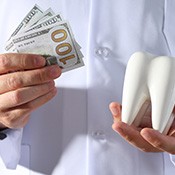
Most dental insurance policies cover 50% of the cost of major procedures like dental implants. However, every plan is different and there’s no guarantee, so it’s worth checking the details so you know what’s included.
If you’re having difficulty finding the information or need help with insurance claims, please let us know! Our friendly office staff is familiar with many providers and can help you maximize your benefits.
Other Options for Making Dentures Affordable

We know that not everyone carries dental insurance, but we don’t want your budget to keep you from receiving what many experts consider the gold standard of replacement teeth. If you’re concerned that you can’t afford dental implants, you could benefit from our flexible financing program. We’ve partnered with a third-party vendor, CareCredit, so that you can break up your final invoice into more manageable installments if your application is approved.
Dentures FAQs
Can I Sleep with My Dentures?
Nothing is more exciting than receiving your new dentures in Los Angeles. You may never want to take them out because they will look and feel natural. However, don’t get in the habit of sleeping with your dentures in your mouth. Your dentist at Rancho Park Dental Group will instruct you to wear them for the first 24 hours, but then you’ll need to take them out before going to bed. Your dentures will restrict blood circulation to your gums. Your soft tissues must be given time to recuperate to prevent sores, inflammation, and pain. Not to mention, your mouth is home to oral bacteria that can get out of control at night. An overgrowth of bacteria can not only harm your oral health and shorten the lifespan of your dentures, but it can also affect your wellness negatively. It’s best to remove your dentures before calling it a night to keep your mouth and body healthy. Place your dentures in an overnight soaking solution to kill harmful bacteria to combat odors.
Do Upper Dentures Always Cover the Palate?
If you have concerns about an upper denture irritating the roof of your mouth or diminishing taste, you have many styles of prosthetics to choose from. Your denture dentist in Los Angeles will explain palateless options, like one with a horseshoe shape.
Can I Use Regular Toothpaste to Clean My Dentures?
Your dentist will advise against using regular toothpaste to clean your dentures because it is abrasive. Toothpaste can scratch your dentures, which can make them look discolored. Plaque and bacteria can get trapped in the scratches, damaging your dentures over time and causing odors. It’s better to use a soft-bristled toothbrush and a mild hand soap or dishwashing liquid. You can also purchase cleaning products made for dentures to keep them clean. Besides brushing them, soak your dentures in an overnight cleaning solution. It will kill any lingering bacteria missed by your toothbrush.
Can I Still Eat Steak with Dentures?
It’s entirely possible to eat steak with dentures, but your dentist will recommend having it in moderation. Steak requires a lot of chewing, which can put additional wear and tear on your dentures. It can also lead to gum inflammation and jaw pain. If you can’t resist a juicy steak, tenderize it before cooking it. Cut it into small pieces to make it easier to chew. A denture adhesive can give you more stability to enjoy your meal without worrying about your teeth falling out.
